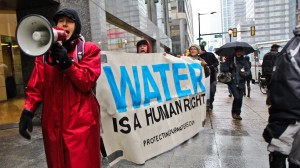Safety concerns arise over cross-state natural gas liquids pipeline
-
Katie Colaneri

Kimberly Paynter/WHYY
Iris Marie Bloom of Protecting Our Waters at a protest in Philadelphia against the Mariner East pipeline which would transport natural gas liquids over 300 miles across Pennsylvania.
Construction is scheduled to begin this month on a pipeline that will connect a refinery outside Philadelphia to the “wet gas” boom in southwestern Pennsylvania.
When complete, the Mariner East pipeline will bring up to 70,000 barrels a day of propane and ethane to feed the Marcus Hook refinery in Delaware County. Propane and ethane are natural gas liquids that are essential for making plastics and are being produced in abundance in the western part of the state. (These natural gas liquids, or NGLs are not to be confused with liquefied natural gas, or LNG which is regular gas cooled down and put under pressure until it’s a liquid.)
The liquids are currently being hauled by truck and rail to the Marcus Hook refinery, which has begun ramping up operations after closing its doors in early 2012. By contrast, pipelines are considered to be a safer, more efficient mode of transport for hazardous materials, but they still require caution.
Recently, a group of protestors rallied outside the Philadelphia headquarters of Sunoco Logistics, the company that now owns the Marcus Hook refinery. Organizer Iris Marie Bloom worried the project would threaten “every single resident along the whole route of the pipeline with explosions.”
Most recently, a natural gas pipeline ruptured and exploded in Missouri around midnight on Thanksgiving.
So, we asked pipeline safety expert Richard Kuprewicz to give us some perspective. He says pipelines carrying natural gas liquids come with a different set of safety risks than a typical transmission line.
“It’s an entirely different emergency response,” says Kuprewicz, who is president of consulting firm Accufacts, Inc. and has 40 years of experience working with and inspecting pipelines.
Natural gas liquids behave differently than natural gas, which is essentially just methane. If a pipeline ruptures, methane will dissipate because it’s lighter than air. Natural gas liquids are heavier than air and form vapor clouds when released.
“The liquid propanes and ethanes, they’ll tend to hug the ground and they don’t have to necessarily be trapped in a building,” Kuprewicz says. “They can detonate on their own.”
In order to deliver them to the refinery, Sunoco Logistics is building 50 miles of new pipeline through Washington, Westmoreland and Allegheny Counties, and reversing the flow of an existing pipeline that currently runs from east to west. The company is currently testing the integrity of the existing line to identify portions that may need to be replaced.
Richard Kuprewicz says pipelines can be built to handle any number of safety risks.
“You can’t prevent all failures, but the vast majority, ones I’ve investigated over 40 years have all been preventable,” he says. “There’s no such thing as an accident.”
















